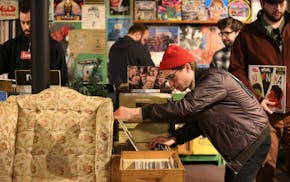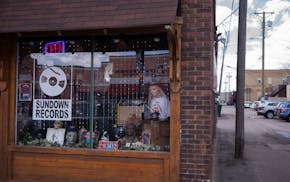The heart of rock 'n' roll is alive and well and drives a FedEx truck around Columbia Heights by day.
By night, onetime Mercury Records artist and former next-great-thing Mary Cutrufello still plays gigs -- not four or five per week, like when Bruce Springsteen sideman Danny Federici was her keyboardist and they did "The Tonight Show" together. Or the summer she toured as the Allman Brothers' opener. Or the near-decade she spent working the Texas "triangle circuit" (Austin, Houston, Dallas).
Nowadays, Cutrufello plays just enough to keep her passion alive. And boy, is it. Never mind that her music career is a shadow of its former self.
The dreadlocked, Yale-educated, baseball-loving, public-transit- using, mixed-race rocker and country picker, 42, has always been a zealot on stage. She might even be more of one now, after being sidelined by vocal-cord damage in the mid-2000s.
"She doesn't so much sing songs," USA Today wrote about her in 1998, "as tear them off, chunk by chunk."
As she tore her way through a recent gig at the 331 Club in Minneapolis -- a town that has yet to grow hip to her unhip appeal -- Cutrufello surprised the bar patrons by introducing a song as "one from a record I made for Mercury Records."
Titled "Highway 59 (Let It Rain)," the 1998 tune foreshadowed her life after moving to St. Paul in 2001: "My truck is old and the tires are worn / And all the miles that stand before me in the darkness / Offer no quarter from the storm."
Mercury was the big time. She had Bon Jovi and childhood hero John Mellencamp for labelmates. Her lone record for the company, 1998's "When the Night Is Through," was produced by "Born to Run" and "Damn the Torpedoes" engineer Thom Panunzio and featured such veteran sidemen as the Heartbreakers' Benmont Tench, Jim Keltner (John Lennon) and Kenny Aronoff (Mellencamp).
Panunzio introduced her to Federici, who, with Springsteen's E Street Band on hiatus, hit the road with Cutrufello for four months. "She has that same love for basic rock 'n' roll that Bruce has, and for songs about basic people," the late keyboardist told me in 1998.
The problem was, "When the Night Is Through" arrived right before Mercury was folded into the massive Universal Music Group. Cutrufello's big record deal ended just as it began.
You won't catch her complaining, though. Really, you won't. For starters, her handlers at Mercury coolly cut her an advance check for another album -- thousands of dollars that helped pay for her relocation.
For another, complaining would defy the workingman's values burned into Cutrufello's music, the Middle America ethics that now also define her life.
"The only thing I could regret is that we didn't all get to become big rock stars," she said. "That's a pretty sorry regret."
Her first trip to the Twin Cities came during the buildup for "When the Night Is Through," when Best Buy featured Cutrufello in a TV and print ad campaign. She returned to play the 400 Bar, the Cabooze and Mick Sterling's big Heart & Soul festival, opening for a then-sweltering Jonny Lang.
"I specifically remember all these teenage girls there to see Jonny having this shocked look on their faces, like, 'I didn't know girls can do that,'" Cutrufello recalled of the 1999 gig, which is when she first pondered moving to Minnesota.
Originally from Connecticut -- where she grew up as the adopted daughter of two white schoolteachers -- Cutrufello would get grumpy every autumn in Houston. The only sign of the changing seasons was baseball writers' maybe-next-year stories about the Astros.
She landed here in the fall in 2001, not long after wrapping her tour with the Allmans. "I was still brimming with confidence," she glibly recalled.
Having moved to Houston shortly after graduating from Yale, she felt she had also completed her studies in Texas: "I went there to immerse myself in Texas music and to learn to play country, and I think I accomplished that."
Among her Lone Star credentials: She played guitar in country crooner Jimmie Dale Gilmore's band in 1996, and later taped her own episode of the TV music showcase "Austin City Limits." She still returns to Texas when the fun gigs beckon, such as Reckless Kelly's Softball Jam in April with Los Lonely Boys and Hayes Carll.
Texans who knew Cutrufello as a country player were a little confused by the heartland rock sounds heard on her Mercury record, so in that regard it made sense to relocate to the Midwest. Little did she know that she would come here to lead the blue-collar lifestyle she had been singing about all those years.
She started working the graveyard shift at the FedEx terminal in Mahtomedi shortly after her relocation, a packing job she intended as "a buffer" to make up for her diminished music income. But then, as she puts it, "One day I tried to sing, and nothing came out."
Her famously husky, powerful voice vanished in 2004 as the result of a polyp, a growth that prevented her throat from closing properly. Although not a smoker, she suffered from years of playing smoke-filled bars. Her options were: "Get it surgically removed or be quiet for a while."
She chose the latter, halting her singing career and doing as little talking as possible for eight months. "It got just short of me having to write everything on a pad of paper," she said.
That's when Cutrufello wound up with her own delivery truck, a job in which she takes great pride. "It feels really good bringing people stuff," she said, but stopped short of calling it inspirational to her music. "It's too much of a grind for that."
After undergoing therapy, she said her voice eventually came back 100 percent. However, she has obvious qualms about shredding her throat all night as she used to do. So she issued an acoustic EP and took to playing mellower acoustic gigs. That, in turn, brought her back to singing country tunes that were part of her repertoire in Texas.
Enter "Fireflies Till They're Gone," the new EP she will promote with a release party Friday at the 331 Club. The six-song, all-twang collection features one tune apiece from Waylon Jennings and Willie Nelson, plus four original tunes ranging from the cheating saga "My Wife Is the Only One Who Knows" to a love letter to Minnesota, "On a Sunday in March, 55082."
"When my voice came back, I was singing with a whole other level of nuance that really suited singing these kind of country songs," she said. "Honestly, I wish I had this voice back when I was playing 200-plus shows a year."
The title of the new EP comes from a line in the Willie Nelson classic "It's Not Supposed to Be That Way," a song that Cutrufello started playing on a whim one night after complaining about a small-town bar's sound system.
She endures a lot of these gigs nowadays. Her schedule ranges from a stop in Chisago City last month to one next month in Marine on St. Croix. She's more liable to play to bikers or country-road mechanics than to urban hipsters. Her longtime drummer Greg Schutte -- also a studio operator and member of experimental group Jelloslave -- thinks this is more a sign of her greatness than a shortcoming.
"It doesn't matter where she's playing, she puts every amount of energy and soul into her performance," Schutte said. As for cynical city fans, "Sometimes people around here aren't sure what to think of her."
Cutrufello is anything but cynical. No matter what, she said, "I'm grateful anytime I open my mouth to sing now and can still do it."
Asked if she would like to give up her FedEx job and go back to playing music full time, she said, "I don't know. That might take away from the fun I'm having now."
Follow Riemenschneider on Twitter: @ChrisRstrib

What to know and seek for Record Store Day 2024 in the Twin Cities

5 vinyl shops in greater Minnesota worth a spin for Record Store Day

Review: Sibling pop band AJR put on a fun show in St. Paul, but not a good concert

